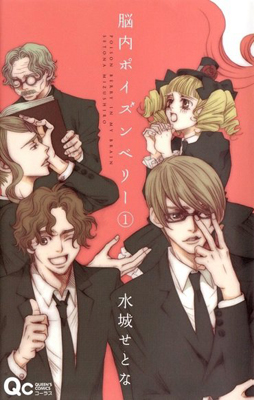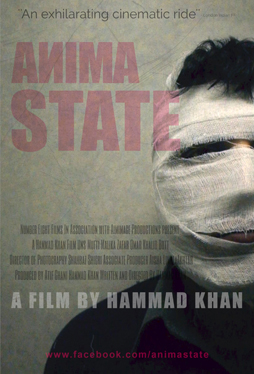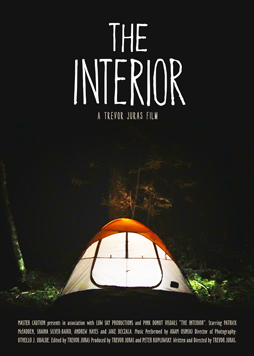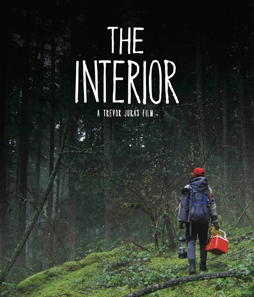Fantasia Diary 2015: Poison Berry in My Brain, Anima State, The Interior
 By this point I’ve discussed all the movies I saw in theatres at the Fantasia film festival, but there remain a half-dozen more that I saw courtesy of the Fantasia screening room. I’m going to write about them over two posts, for ease of reading. And then I’ll have a coda wrapping up my Fantasia coverage with thoughts on what I saw, and the value of the festival. For now: reviews of the psychological romance comedy Poison Berry in My Brain, the metafictional satire Anima State, and the suspense movie The Interior. All of them, one way or another, directly to do with what happens inside the head.
By this point I’ve discussed all the movies I saw in theatres at the Fantasia film festival, but there remain a half-dozen more that I saw courtesy of the Fantasia screening room. I’m going to write about them over two posts, for ease of reading. And then I’ll have a coda wrapping up my Fantasia coverage with thoughts on what I saw, and the value of the festival. For now: reviews of the psychological romance comedy Poison Berry in My Brain, the metafictional satire Anima State, and the suspense movie The Interior. All of them, one way or another, directly to do with what happens inside the head.
Poison Berry in My Brain (Nounai Poison Berry) was directed by Yuichi Sato from a script by Tomoko Aizawa, based on a manga by Setona Mizushiro. The idea may sound a little familiar: Ichiko Sakurai (Yôko Maki) is a thirty-year-old woman novelist in Japan who has people living in her head. These five people are dressed in suits, and argue like a corporate board as they try to decide what Ichiko should do in any given situation. They are her emotions, her inner drives. And they get a workout as Ichiko meets and falls in love with a young artist (Yuki Furukawa), and then among the storms of that relationship sees the spark of something between her and her editor (Songha).
Comparisons with Pixar’s Inside Out are inevitable. Or almost inevitable; in fact I haven’t seen the Pixar film, so we can dodge that bullet. I will say firstly that so far as I can gather from Wikipedia, the manga appeared just after Pixar began working on their movie — this is independent invention. Secondly, from what I understand of Inside Out, there’s a bit of a difference here: the descriptions I’ve read say that in that movie the characters who live in the main character’s head all represent a specific emotion. The board members directing Ichiko are more general. They represent tendencies. Dithering but sympathetic Chairman Yoshida (Hidetoshi Nishijima) keeps order but can’t seem to make a decision on his own; Ikeda (Yo Yoshida) is convinced that everying Ichiko does is doomed to failure and she should quit before she stops; the energetic Ishibashi (Ryunosuke Kamiki) always looks on the bright side; young gothic lolita Hatoko (Hiyori Sakurada) is impulsive and childlike — unsurprisingly, being literally a child — while old Secretary Kishi maintains Ichiko’s memories but contributes little to the discussions as he’s so often caught up in the past.
 Their interactions are a lot of fun, and are pushed in interesting directions by the emotional turbulence unleashed by Ichiko’s relationships. Ichiko herself makes sense as a coherent character quite apart from the bickering in her brain of which she herself is unaware. The film does end up divided in two; there’s the outside world, and then the inside world — which is perhaps more interesting. The board meets in a castle in the sky. Excess trauma, we learn, can cause a board member to break down. And there is a mysterious sixth board member who appears at significant moments.
Their interactions are a lot of fun, and are pushed in interesting directions by the emotional turbulence unleashed by Ichiko’s relationships. Ichiko herself makes sense as a coherent character quite apart from the bickering in her brain of which she herself is unaware. The film does end up divided in two; there’s the outside world, and then the inside world — which is perhaps more interesting. The board meets in a castle in the sky. Excess trauma, we learn, can cause a board member to break down. And there is a mysterious sixth board member who appears at significant moments.
Visually, the film’s mostly solid rather than startling. But the constant discussion around the board table never gets dull. Part of that’s simply the contrast between the somewhat archaic castle setting and the crisp suits of the board. But part also is good blocking and camera movement; there are some stagy elements to the boardroom scenes, as the characters act against a single setting, but it manages to avoid feeling limited.
The romance elements are predictable. You can see how Ichiko’s relationships are going to go, if not necessarily how far they go before ending up where you expect. And the two men in Ichiko’s life turn out to have a shared past, and the nature of that link seems a bit too much of a coincidence. But if that’s unfortunate, it’s not enough to sink the movie. The themes come through clearly, if (again) predictably. “If you can’t love yourself, you will never be happy,” we’re told, and that’s true. So is this: “The important thing is not who we love, but who allows us to love ourselves.” They’re not stunningly original lines, but they’re enough to hang a movie on.
The film never really raises the issue of whether other characters also have board members in their brains. It’s not necessary, I suppose, and it does mean that we’re firmly following Ichiko at every point in the movie, knowing what she feels perhaps better than she does. Something else happens, too, I think. The characters all have a reasonable amount of depth, but we have a special knowledge of Ichiko. We relate to her differently, and indeed differently from the way we relate to other characters in the film. We relate to her not just as a character herself, but as a character made of other characters (a little like those Transformers made up of a group of smaller Transformers). It’s an interesting effect.
At any rate, Poison Berry is a successful comedy. The jokes work, and the attitudes to love and relationships are healthy. It’s a very solid movie, entertaining if not earth-shattering.
 And then there’s Anima State. It’s something completely different. Directed by Pakistani Hammad Khan, it’s a bitter satire of modern-day Pakistan. It opens with definitions: “Anima. The part of the psyche that is directed inward and in touch with the subconscious” and “State. Condition, situation, or country.” The state of the state of Pakistan.
And then there’s Anima State. It’s something completely different. Directed by Pakistani Hammad Khan, it’s a bitter satire of modern-day Pakistan. It opens with definitions: “Anima. The part of the psyche that is directed inward and in touch with the subconscious” and “State. Condition, situation, or country.” The state of the state of Pakistan.
The movie follows a wanderer with a gun and a face wrapped in bandages (Uns Mufti). The Stranger (as the IMDB dubs him) shoots some people for no obvious reason and tries to turn himself in, but the cop he finds can’t be bothered to deal with him so he shoots the cop. He wanders around, watches old movies, talks to a waiter who wants a strong Pakistan and who beats his wife — “God has given us this much privilege” — then does drugs with another man and masturbates to a cricket match and tries to get on TV to confess his crimes but finds his murders are too small-scale. He finally gets a spot on the tube when he promises to commit suicide live. He doesn’t, and starts speaking directly to the camera. There are scenes with college students, and, crucially, a prostitute — after which everything changes, and the movie turns black and white, and follows a filmmaker (Uns Mufti again) returning to Pakistan and finding himself out of place.
I have no personal connection to Pakistan, which does limit my ability to speak knowledgeably about this movie. I will say I think the broad strokes of Khan’s vision come through. As I understand it, he’s attacking a society that he feels represses sexuality; thus repressed sex, national pride, and violence all blend together, as in the figure of the waiter — the servant who dreams of strength. Khan also seems to speak here of an obsession with triviality and venality.
 It’s a dense, complex, allusive film. Khan’s aware that the anima, in Jungian psychology, is the feminine archetype within a male mind; again according to the IMDB, one actress, Malika Zafar, is credited as “the Archetypes of Woman.” That’s why the visit to the prostitute changes the whole movie.
It’s a dense, complex, allusive film. Khan’s aware that the anima, in Jungian psychology, is the feminine archetype within a male mind; again according to the IMDB, one actress, Malika Zafar, is credited as “the Archetypes of Woman.” That’s why the visit to the prostitute changes the whole movie.
But then there are other things going on as well. The Stranger is concerned with vision. Why is he bandaged? “My head might explode,” he says at one point. The prostitute tells him a story of a man who recorded himself during sex so he could see his own face. On the other hand, in the next section of the film, as a filmmaker he wears no disguise.
 There is a sense that this movie is less narrative than it is commentary. The protagonist doesn’t have a clear goal toward which he progresses. That’s fine. I found I enjoyed the movie as it was, for all my abysmal lack of knowledge of Pakistan. As a work of satire it seemed almost classical in the societal ills it diagnosed, and in the clear anger it displayed regarding them.
There is a sense that this movie is less narrative than it is commentary. The protagonist doesn’t have a clear goal toward which he progresses. That’s fine. I found I enjoyed the movie as it was, for all my abysmal lack of knowledge of Pakistan. As a work of satire it seemed almost classical in the societal ills it diagnosed, and in the clear anger it displayed regarding them.
And although it was clearly shot on a budget, it was pleasant to look at. The imagery was inventive, and the editing juxtaposing the images was effective. Use of deep focus was pleasant, as was the colour sense. It’s a well-crafted movie.
There’s an energy here, as the Stranger lurches from situation to situation. He has a TV monologue that recalls Paddy Chayevsky: he’s mad as hell and he’s not going to take it any more. That’s what I mean about the classical feel of the satire here; as you watch the movie you can hear the blistering attack on the unconscious state echo everything from the Bible through to The Daily Show. I don’t say that captures all or even most of what Khan’s doing, and I assume someone more familiar with Pakistani culture would see aspects of it that I don’t. But as an outsider, what I notice here is the archetypal aspect of satire.
 From the outside to the in: The Interior is a Canadian film, by Trevor Juras, and it too deals with a protagonist taking a trip into his own psyche. It follows James (Patrick McFadden), an ad man who hates his job. The first third or so of the film is a straight-faced comedy as he gets himself fired, finds a new job cleaning houses — and then gets some bad news from his doctor. He breaks up with his girlfriend, and travels to the thick forests of the interior of British Columbia. At this point, 26 minutes into a 77-minute film, we have a title card.
From the outside to the in: The Interior is a Canadian film, by Trevor Juras, and it too deals with a protagonist taking a trip into his own psyche. It follows James (Patrick McFadden), an ad man who hates his job. The first third or so of the film is a straight-faced comedy as he gets himself fired, finds a new job cleaning houses — and then gets some bad news from his doctor. He breaks up with his girlfriend, and travels to the thick forests of the interior of British Columbia. At this point, 26 minutes into a 77-minute film, we have a title card.
The remainder of the film follows James as he lives alone in a tent, haunted by increasingly threatening presences. He has no one to speak to, so is silent; he used to dream of starring in a rap video, he used to use words to convince people to buy things, and now his use of language is degenerating to the point that he can’t even write his ex-girlfriend a letter. Meanwhile he catches glimpses of someone threatening, his food and gear are moved by unknown people — or are they? The further into the movie we go, the harder it is to tell what’s happening in reality and what’s happening in James’ head.
Visually, this is a very strong movie, shot at first with a cool elegance and then a more ragged sensibility in the winter woods of British Columbia. The contrast of the two sections of the movie is stark. Juras handles individual shots nicely; the scene where James breaks up with his girlfriend is staged with the two of them sitting at ninety degrees from each other, neither looking to each other, and it’s effective, original, and real. Mention should also be made of the sound of the film, both the sound design — down to the grunts and puffs from James when he’s alone in the woods — and the spare piano music that plays over a nightmarish scene with a car chasing James late in the film.
 The execution is nice; and the central idea is a strong one. We see James mentally stripped down, literally travelling into his interior. He’s been built up as a character, and now he’s taken apart, falling into madness and paranoia. Man against nature: an old story, and Juras knows that what often makes it work is the fact that it’s really man against himself. Man against his own unconscious. As a Canadian, Juras here is taking part in a tradition (which I’ve mentioned on Black Gate before) of depicting the wild as threatening and external, but also as a kind of screen against which the nightmares and fears of the protagonist are projected.
The execution is nice; and the central idea is a strong one. We see James mentally stripped down, literally travelling into his interior. He’s been built up as a character, and now he’s taken apart, falling into madness and paranoia. Man against nature: an old story, and Juras knows that what often makes it work is the fact that it’s really man against himself. Man against his own unconscious. As a Canadian, Juras here is taking part in a tradition (which I’ve mentioned on Black Gate before) of depicting the wild as threatening and external, but also as a kind of screen against which the nightmares and fears of the protagonist are projected.
So there’s a lot good here. And yet I don’t think the film works overall. James is stripped too far, I feel. Through the last third of the film, we don’t — or at least I don’t — know what we’re looking at when we see him. The lack of language isn’t made up for in visual communication. As a character, he becomes too distant from what we saw in the first third or half of the film. And it has to be said: it becomes difficult to tell what’s real and what isn’t. But then, assuming that the threats James thinks he sees are largely internal, what does it mean? I couldn’t tell.
I’d have to say, regretfully, that this movie fails the ‘would I watch it again to put it together’ test. I suspect I might get a better sense of what I’m seeing if I did watch it again. But I’m not convinced it’d be that rewarding. I’m not sure James has that much to say, in language or otherwise. The movie’s not interested in being genre entertainment, so the thriller plot doesn’t work because it’s far too random, and indeed too internal; but without that, what is there? A man’s slow degeneration, I suppose. But what’s the point? What does that have to say? I might find something if I watched the movie again. But I find myself unmoved by the idea.
(You can find links to all my 2015 Fantasia diaries here.)
Matthew David Surridge is the author of “The Word of Azrael,” from Black Gate 14. His ongoing web serial is The Fell Gard Codices. You can find him on Facebook, or follow his Twitter account, Fell_Gard.